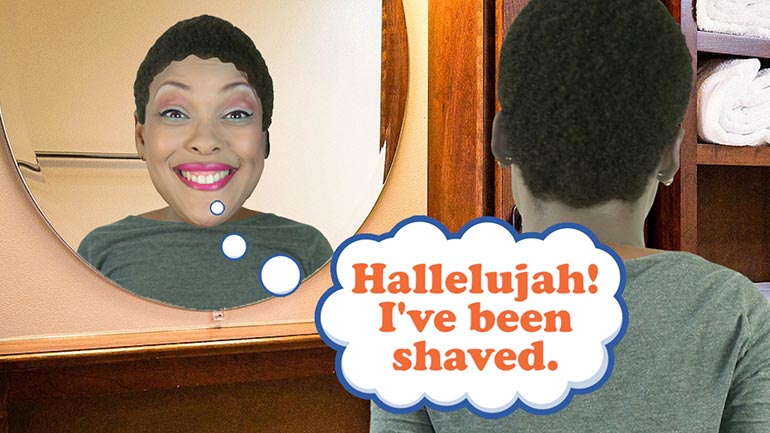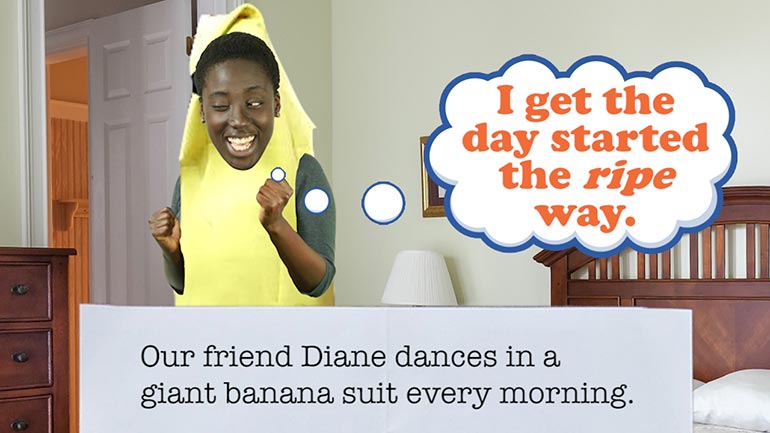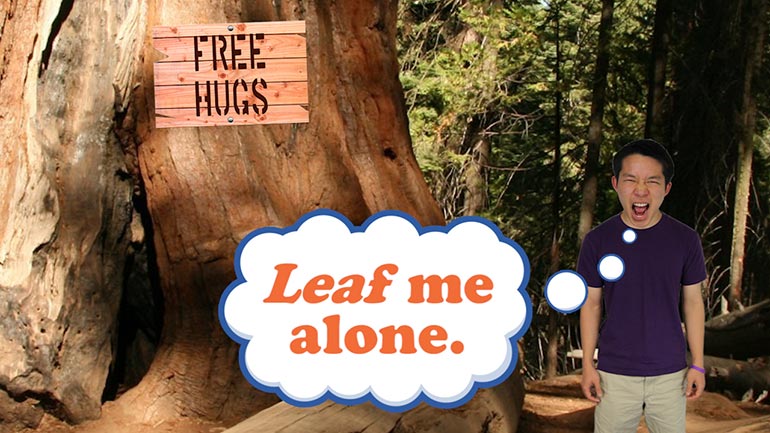ShmoopTube
Where Monty Python meets your 10th grade teacher.
Search Thousands of Shmoop Videos
ELA 4: Keep it Short and Sweet with Relative Pronouns 151 Views
Share It!
Description:
This is a video that will teach you about relative pronouns. How's that for short and sweet, video?
Transcript
- 00:05
[Dino and Coop singing]
- 00:13
Have you ever met someone who seemed to use a hundred words just to say the simplest thing? [Guy saying hello in lots of different languages]
- 00:18
The sort of person who might say they “do love to indulge in the occasional slice of
- 00:23
frosted dessert” instead of simply saying that they, uh… like cake? [Waiter looking confused]
- 00:28
Usually, it's better to get to the point using as few words as possible.
Full Transcript
- 00:32
And there's no better way to keep things short and sweet than with relative pronouns.
- 00:36
So… what's a relative pronoun? Is it…a pronoun you have to share bunk beds with?
- 00:41
Uh, no. In this case, the word relative does refer to a relationship, but it's the relationship [Guy on the bottom bunk, with the word pronoun bouncing on the top bunk]
- 00:46
between a clause or phrase being connected to a noun or pronoun. [Coop pointing at a blackboard]
- 00:50
Usually, a relative pronoun takes the form of one of these: who, whoever, whom, whomever, [The words being written in a list]
- 00:57
that, which, when, where, or whose.
- 01:01
Okay…you still might have no idea what we're talking about, so… let's dig a little deeper. [Shovel digging in dirt]
- 01:06
Take a look at Tommy here.
- 01:08
Now instead of calling Tommy, well, Tommy… let's try and use one of our relative pronouns [Boy smiling]
- 01:12
to make a statement about Tommy.
- 01:14
First up… “who.” So let's say...
- 01:16
“Who likes swimming.”
- 01:17
Um… doesn't make a whole lot of sense, does it? [Tommy looks confused]
- 01:20
That's because it's a dependent clause. It depends on the rest of the sentence, but as [Dino pointing at a blackboard]
- 01:24
it stands, it’s an incomplete sentence. No good.
- 01:27
In order for it to make sense, we'd want to say “Tommy likes swimming.” [Tommy jumping into the pool]
- 01:31
Much better.
- 01:32
Now what if we also wanted to say that Tommy is a boy, just in case there was any confusion.
- 01:37
The kid does like to paint his nails, after all. [Tommy's hand with pink painted nails]
- 01:39
Here, we would say...
- 01:40
“Tommy is a boy.”
- 01:42
So we've got...
- 01:43
“Tommy is a boy.” and “Tommy likes swimming.”
- 01:45
Two perfectly fine sentences. So… where the heck does our relative pronoun come into
- 01:49
the picture?
- 01:50
Well, suppose we wanted to combine the two sentences into one sentence.
- 01:54
We would use a relative pronoun to say...
- 01:56
“Tommy is a boy who likes swimming.”
- 01:58
Voila! There's that dependent clause from earlier, but this time it has the first part [Arrow pointing to the dependent clause]
- 02:03
of the sentence to depend on.
- 02:05
Instead of having two separate sentences to say two separate things, this relative pronoun
- 02:09
allows us to say two things in one sentence, shortening everything and making it a whole [Someone picking up a packet of Rolaids]
- 02:13
lot easier to digest.
- 02:15
Although the Rolaids probably will help, too.
- 02:17
Take a look at some other examples here... [Guy with the Rolaids after eating his cake]
- 02:19
“Star Wars is the movie that everyone is talking about.”
- 02:22
“My friend has a little brother who is annoying.”
- 02:25
“Larry has a brother whose house is inside of a giant lobster.” [The sentences being written out]
- 02:28
Each uses a relative pronoun to make the sentence shorter and more to the point. [The relative pronouns are circled]
- 02:33
Now if only you could teach your Great Aunt Rose to get to the point. [Aunt Rose saying a really long sentence]
- 02:36
There’s a reason everyone calls her “Ramblin’ Rose”… [Everyone else looks bored]
Up Next
Sticks and stones, right? Well...only sometimes. It's a good idea to make sure your words aren't going to hurt others. Let's look at some ways to d...
Related Videos
Learn to debate like a champ. It's way better than debating like a chimp. That just takes mudslinging to a whole new level.
Today we'll learn about biographies and autobiographies. And no, the second one has nothing to do with the lives of cars.
In this lesson we'll subject you to some verbs and predicates. Each one is a necessary part of a complete breakfas—er...sentence.
Choosing words carefully is important. You may end up vexing the assemblage of citizens you're conversing with...or you might even just plain bore...




